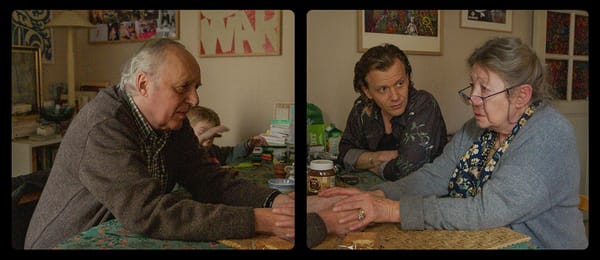Critics who once dismissed Gaspar Noé are now heaping him with accolades. You would be forgiven, then, for thinking that Vortex, the latest from the Argentinian-French director, is a better or more “serious” film than others he has made. Nothing could be further from the truth. Make no mistake: Vortex is a masterpiece. I haven’t been so physically jarred or emotionally moved by a work of film art in at least a few years. That said, Vortex isn’t an outlier in Noé’s filmography. It is one more masterpiece by one of the most exciting, thought-provoking, and formally innovative filmmakers of his generation.
Vortex tells the story of an elderly couple slowly disintegrating under the weight of disease. The man, played by the giallo horror auteur Dario Argento, has a bad heart. The woman, played by Francoise Lebrun, is losing her memory. The film takes place in a single setting, their apartment, and employs a split screen, with each screen tracking one half of the couple.
No doubt, the relatability of the subject matter (many of us are acquainted with the horrors of dementia) and the comparative formal simplicity of Vortex have made it easier for mainstream critics to digest than previous Noé offerings. But what unites Vortex with his broader filmography is its focus on the absolute limits of human experience, brilliantly depicting what the French philosopher George Bataille eloquently described: “The limit is only there to be overreached. Fear and horror are not the real and final reaction; on the contrary, they are a temptation to overstep the bounds.” Noé’s characters overstep those limits, willingly or not. Abandonment, fascination, suffering, madness, poetry: Noé’s singular talent is his ability to take viewers to the absolute extremities of human existence.
Each of Noé’s films uses an unusual formal technique to bring viewers to the edge of being. His second, Irréversible (2002), used reverse chronology to catch up the viewer in the fury and disorientation of men seeking vengeance after a woman they love has been brutally raped (the rape scene in question is an unflinching, nine-minute, unbroken shot). Enter the Void (2019) used a first-person viewpoint to make the viewer identify with a protagonist who brushes up against drug-induced death of ego and death itself, the final destination. Love, his 2015 exploration of erotic obsession, was presented in 3D—complete with ejaculations. In Climax (2018), Noé illustrated the truth of Bataille’s claim that divine ecstasy and extreme horror can be identical experiences. The film follows a French dance troupe that has its punch tainted with powerful LSD at an afterparty. Noé deployed a single moving shot to engulf the viewer in the panic that saturates the party once the drug takes effect, forcing us to watch as some of the dancers descend into horrific madness, while others lose themselves in sublime ecstasy.
